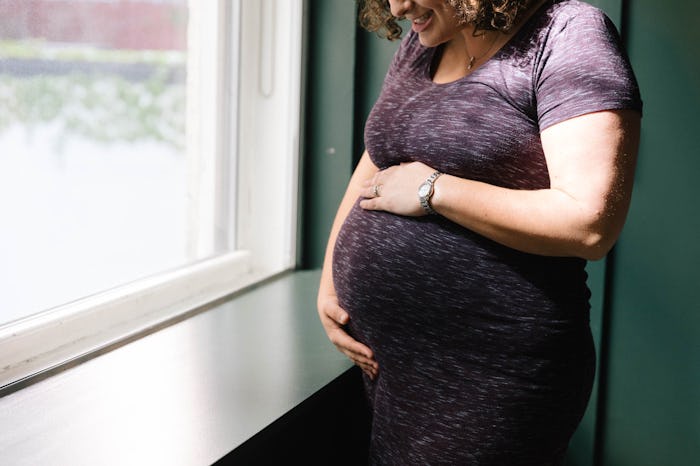Is there anything more exciting than finding out the sex of your baby-on-the-way? Whether you want to know early via sonogram or wait until the big delivery day, the surprise of being told you have a son or daughter is an incredible feeling. These days many couples want to know as early as possible, so when can you find out the baby's sex during pregnancy?
According to Dr. Adrianne Browning, an OB-GYN at Baylor University Medical Center in Dallas, "The genitals begin to develop at six weeks, but they do not differentiate based on the sex until 12 to 14 weeks when the genital tubercle starts to point upward for males and regress downward for females. By around 14 to 16 weeks, you can identify either the three lines that make up the labial folds or the penis and scrotum."
But don't go scheduling that 14 week ultrasound just yet. In an exclusive interview, Browning tells Romper that a highly experienced sonographer could see the difference in genitalia about 80 percent of the time at 12 weeks and 98 percent of the time at 14 weeks, however other factors have to line up as well — in addition to the expertise of the sonographer, the fetus must be in an accessible position and there must be enough fluid present to provide contrast.
For these reasons, most practitioners like to wait a little longer to tell a mother the sex of her baby via ultrasound. However, prenatal testing with cell-free DNA or amniocentesis might predict whether the baby is male or female with up to 100 percent accuracy. But, according to Browning, because of the cost and risk of miscarriage associated with these tests, they are usually only done if screening tests have abnormal results or the parents have a known genetic disorder.
Browning says that 99 percent of the time the sex can be accurately determined by an average sonographer at 20 weeks, which has become the industry standard, but that no method is truly error-proof. She points out that certain rare adrenal disorders and testosterone receptor dysfunction can make it difficult to tell even after the baby is in your arms. Who knew?
If waiting for week 20 feels unbearable to you, Browning says that over-the-counter blood tests are supposedly 95 percent accurate after just seven weeks. It might not hurt to try, but then again wondering about the accuracy could end up driving you crazy for months. You might be better off waiting patiently for that mid-pregnancy ultrasound. Wasn't pale yellow always one of your favorite colors anyway?
